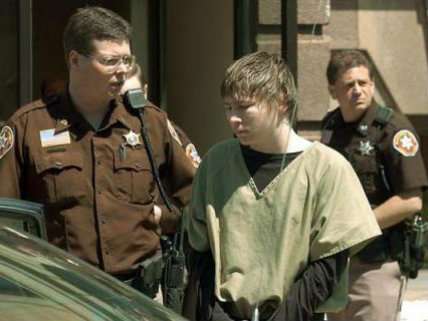False Confessions Like Brendan Dassey's Are Common Among Exonerated Juveniles
Minors are psychologically susceptible to being coerced into false confessions and yet frequently interrogated without parents or lawyers around.

New details about the case against Steven Avery keep emerging as U.S. audiences flock to Making a Murderer, the Netflix series documenting Avery's path from wrongfully convicted inmate to free man suing the government to suspect in a violent murder and possible target of malicious cop conspiracy. Despite popular petitions calling for Avery's pardon, some are now suggesting that Avery is both guilty of murder and the victim of planted evidence. Yet whether Avery is guilty or innocent, the confession of his alleged co-perpetrator, nephew Brendan Dassey, seems undeniably coerced by the Manitowoc County police.
We know this thanks to videotaped recordings of the March 2006 interviews—recordings that likely wouldn't have happened had Dassey been questioned a year earlier. But in July 2005, the Wisconsin Supreme Court held that police must electronically record all interrogations of minors.
In Dassey's taped interrogation, detectives feed the then-16-year-old info about the crime, a crime which he's also been hearing sensationalistic info about in local news for several days. Dassey, an intellectually challenged teen being questioned about rape and murder, has no parent or lawyer present. When he disputes the detectives' version of events, they tell him to stop lying. When he confirms them they coax him on, telling him they already know the truth and if he just says it they'll let him be. He won't get in trouble. They'll help.
The extent to which Dassey doesn't understand the seriousness of what he's doing is made most clear when, after "confessing" to rape, slitting a woman's throat, and helping burn her body, Dassey asks detectives how much longer this will take because he has a school project to turn in during afternoon period. He thinks he'll be able to just get up and go back to school.
That someone could confess to horrific things they did not do seems outside the realm of imagination for most people. But false confessions aren't all that uncommon in our criminal justice system. According to an Innocence Project analysis of 225 wrongful-conviction cases cleared by DNA evidence, 23 percent were based on false confessions. Data from the National Registry of Exonerations places false confessions at the root of 13 percent of all exonerations, with the highest rate (22 percent) for homicide cases. False confessions were a factor in eight percent of exonerations for sexual assault.
For juveniles, the false confession rate is even higher.A 2005 analysis of 340 exonerations found 42 percent of juvenile cases involved false confessions. A 2013 analysis from the National Registry of Exonerations put the percentage of juvenile exonerations involving false confession at 38 percent.
A Huffington Post roundup of false-confession news from 2015 shows case after case where those who confessed were teenagers. There's Bobby Johnson, who in September was exonerated after falsely confessing to murder at age 16 and spending 9 years in prison. There's Davontae Sanford, who was just 14 when he confessed to a quadruple murder at a crack house and has spent nearly a decade in prison although a hitman guilty of at least eight other murders also took credit for these crimes. The Center on Wrongful Convictions and Michigan's Innocence Clinic have been petitioning for a new trial for Sanford.
In December, Donovan Allen was exonerated by DNA evidence, becoming the 334th American exonerated by DNA. In 1990, Allen, then 18, falsely confessed to the murder of his mom.
There are many psychological reasons why minors are succeptible to being coerced into false confessions, but one practical factor that shouldn't be discounted is improper interrogation practices. An 2014 paper in Law and Human Behavior analyzed 57 teen interrogations from 17 different police jurisdictions and found a parent present just 12 percent of the time and a lawyer present for none.
False confessions "are consistently one of the leading, yet most misunderstood, causes of error in the American legal system and thus remain one of the most prejudicial sources of false evidence that lead to wrongful convictions," writes University of San Francisco law professor Richard A. Leo in a 2009 paper. Yet "despite substantial documentation and analysis by scholars, the phenomenon of police-induced false confessions remains counterintuitive to most people," who believe in "the myth of psychological interrogation: that an innocent person will not falsely confess to police unless he is physically tortured or mentally ill."
Leo suggests that mandatory recording of all criminal interrogations is the best way to combat coerced confessions, while also recommending improving police training about false confessions, putting time limits on interrogations, and setting better standards for interrogating minors. "Such reforms, however, are likely to occur slowly in the United States," concludes Leo. "American law enforcement … remains steeped in the use of investigative methods and interrogation techniques that continue" to produce false confessions.


Show Comments (44)